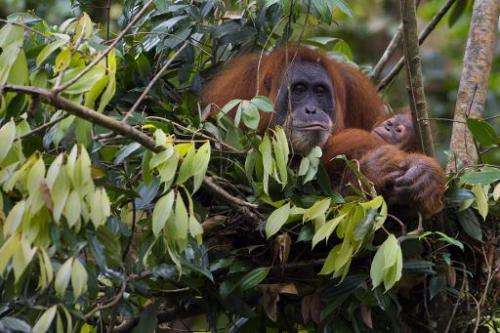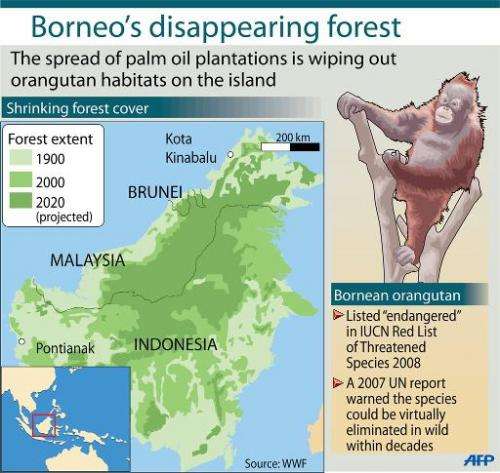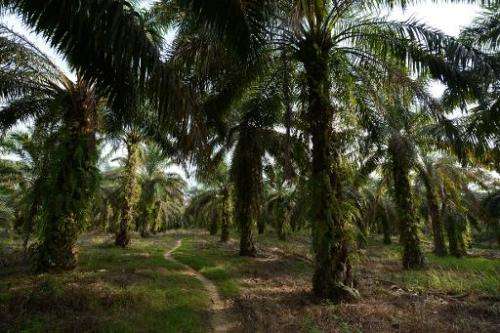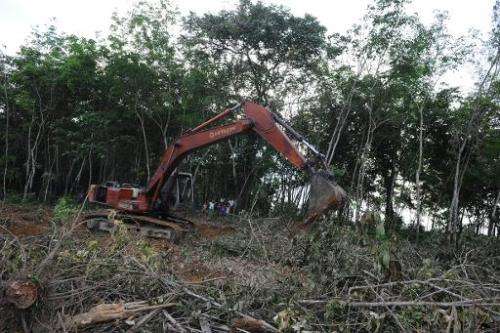Great apes facing 'direct threat' from palm oil farming

The destruction of rainforests in Southeast Asia and increasingly in Africa to make way for palm oil cultivation is a "direct threat" to the survival of great apes such as the orangutan, environmentalists warned Thursday.
They said tropical forests were tumbling at a rapid rate, with palm plantations a key driver, despite efforts by the industry's Roundtable on Sustainable Palm Oil (RSPO) to encourage sustainable cultivation.
The concerns were voiced at the sidelines of the annual RSPO meeting, held this year in Malaysia and which concluded Thursday.
"Orangutan and ape habitats are being destroyed," said Doug Cress, from the UN Environment Programme's great ape protection campaign.
"The destruction of rainforest in Southeast Asia and increasingly now in Africa is a direct threat to the great apes."
In Southeast Asia alone, up to one million hectares of forest—nearly the size of Jamaica—is lost annually to agricultural expansion like palm oil, said Adam Harrison, agriculture policy specialist with the WWF.
"(Land clearing for plantations) has been high. Some of them are in high-quality forests which will have an impact on climate change," he said.
Habitat destruction
"The orangutans will become extinct within a few decades. In Borneo island we are already seeing that there are only a handful of rhinos left. It is not a viable population and it will go extinct," Harrison added.
Borneo is shared by Malaysia, Indonesia and Brunei.
The problem is most acute in leading palm oil producers Malaysia and Indonesia, which account for 85 percent of world production, conference participants said.

In Southeast Asia, palm oil is a versatile and cheaply farmed cash crop promoted to eradicate poverty. In return, the growers who live on allocated land become a strong vote bank for the ruling government.
But it is now also a looming threat in even more poorly regulated Africa, where the industry is set to "explode", according to Cress.
Derived from the fruit of the oil palm, its use has skyrocketed in recent years and it is now a key ingredient in a vast range of every-day products, from lipstick to instant noodles, shampoo and ice cream.
The RSPO, bringing together stakeholders including producers, end-user manufacturers, and environmental groups, was formed in 2004 as concern over the ecological impact of mushrooming palm cultivation took off.
It seeks to promote production that is environmentally sustainable and respects native land rights, but the organisation's efficacy has increasingly been questioned as forest destruction has continued.

Palm plantations, along with other drivers of deforestation, have been linked to the destruction of habitats critical to endangered species such as orangutan, Asian rhinos and tigers.
Harrison cited as an example Tesso-Nilo National Park in Indonesia, which was set aside as a preserve for tiger and elephant habitats.

"Half of the national park was cleared for palm oil by small-holders. The small-holders then sold the fruits to RSPO members. This is unacceptable," he said.
Harrison said if deforestation continued at current rates, tiger and elephant populations in Southeast Asia could be wiped out within in a decade.
© 2014 AFP


















